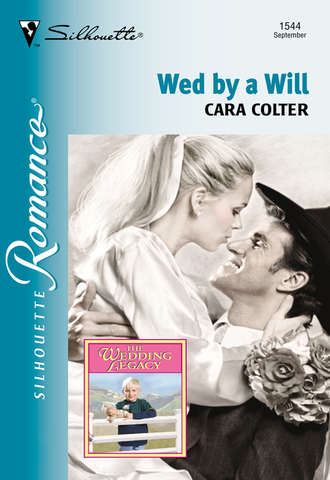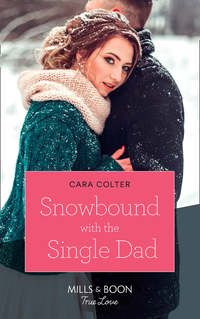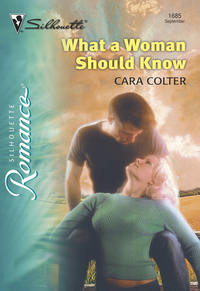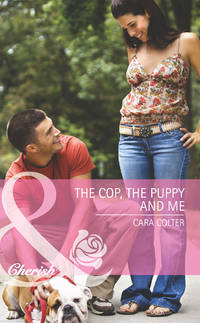
Полная версия
Wed By A Will
She could see his pulse beating in the curve of that strong neck. The white T-shirt molded the firm, hard lines of his chest and the broad sweep of his shoulders. Where the short sleeve of the shirt ended a rock-cut bicep began. The white of the shirt made the copper tone of his skin appear deeper. Her eyes wandered down the length of that arm, to the corded muscle of a powerful forearm, the squareness of a wrist twice the width of her own.
Embarrassed for looking, she forced her gaze back up to his eyes.
She could see they were more than brown; they were dark as new-turned earth, flecked with little spangles of gold.
And in the strong sunlight, she could see those eyes held a pain in them that could compete with any of her own.
The truck pulled up at the bottom of her stairs, a vehicle in a state of disrepair worse than her Jeep.
Her neighbor stepped over her broken step with the ease of a man who was used to putting his feet in all the right places, and went up to the window, which the driver rolled down.
“Corrie Parsons?” The driver looked grizzled, and dirty. There was a look in his eyes that she could recognize at ninety yards. Plain old garden variety meanness.
Donahue looked back at her for confirmation, and she nodded, not even sorry to give up her name to him after all. In fact she was glad suddenly that he was here. She got a familiar uneasy feeling from that man in the truck, with his stained teeth and squinty eyes and stubbled jowls.
With surprise she realized that Matt Donahue had either picked up on her split second of dislike, or harbored some of his own, because there was something almost protective in the way he turned back to the truck, and answered for her.
“This is the Parsons’s place.”
No one had ever protected her before, not even casually, and she did not like the way his small gesture threatened to soften something hard within her.
At that moment, a sound like Corrine had never heard reverberated through the air. It was like amplified fingernails across a blackboard crossed with the shrill howl of a saw blade shrieking through wood.
Matt Donahue didn’t jump back the way she did. Instead, he moved away from the vehicle door, swung himself up on the deck of the truck, and peered through the worn board slats of the stock rack.
“Yup,” the man said, opening his door and sliding out, “I’m Werner Grimes, delivering a prize-winning mammoth jack and he’s all yours.”
Matt Donahue jumped back down, shot a look over his shoulder at her that was distinctly grim.
“I thought you said you didn’t have any livestock,” Donahue said.
“I don’t! I don’t even know what a mammoth jack is. It sounds like something that’s been extinct for several million years crossed with a rabbit.”
“Ha-ha. That’s ’bout as good a description of him as I’ve ever heard,” Grimes said, going around to the back of his truck and lowering a ramp. “Mister, you want to give me a hand with this?”
“She says it’s not hers.”
“And this paper right here says it is, bought and paid for.”
While the men were at the back of the truck, arguing ownership, she crept down the stairs of the cabin and came around to the side of the truck. She couldn’t see anything. She climbed up on the deck, as she’d seen Matt do, only with less grace. She looked through the slats.
The saddest pair of brown eyes she had ever seen looked back at her from under bushy eyebrows. Long scruffy ears were turned toward the men, listening. For a moment it almost seemed like maybe it was some sort of prehistoric creature crossed with a rabbit.
“A donkey,” she whispered. She stuck her fingers through the slats and felt a soft, velvety nose touch her.
“Git your hand out of there!” the man shouted at her, and she jerked back so quickly she nearly fell off the wheel well. “Darned critter is meaner than a rattlesnake. He’ll take off your arm at the elbow.”
She stared at Grimes, aghast, and thought of the soft muzzle that had momentarily touched her fingers.
“Look, there’s obviously been a mistake,” her neighbor said.
“No mistake,” Grimes insisted. “Right name. Right address. Stand back. I’m going to open the gate.”
“She doesn’t want a jack. And neither do I. I’ve got a pasture of full-blooded quarter horse mares right next door, just foaling out, and I’ll be damned if I’m planning a crop of mules next year.”
“You better have a strong fence up then.” The man spat. “He’s hornier than—”
Donahue cut a look to her falling-down fences, and then interrupted Grimes before he had a chance to educate them about exactly how horny her donkey was.
Her donkey.
“How much to take him back wherever he came from?”
Her neighbor was reaching into his back pocket, taking out his wallet, which seemed to her to be a slightly autocratic thing for him to be doing, though it was a little late to decide she wanted control of the situation.
A certain whiney note appeared in the donkeydeliverer’s voice. “Geez. It took me near three hours to load the sum-bit—”
“Just name a price,” Donahue said coldly.
“Two hundred and fifty?”
“Get real.”
“Okay. One fifty then. Not a penny less.”
“I’ll give you fifty bucks to turn that truck around, with the donkey onboard.”
He was a mean donkey, Corrine reminded herself. He’d take her arm off at the elbow if she gave him the opportunity. And apparently he had an immense appetite for things other than grass. A mean, disgusting donkey.
Whose muzzle had felt like velvet against her fingers.
And whose eyes had been so unbearably sad.
“Wait,” she said, when she saw the money about to change hands. “Wait. I want him.”
Something pitiful flashed in the donkey man’s eyes as he saw his chance to make a quick fifty bucks disappearing.
Matt Donahue turned and looked at her. “You want who?”
Since only Donahue, Grimes and the donkey were in her yard, her answer was bound to be insulting. Yet it gave her great pleasure to say, “The donkey.”
He came toward her in long strides, his eyes flashing fire. “Do you have any idea what my brood stock is worth?”
She shook her head, having only the vaguest idea whatever stock he was talking about was probably not registered on the NASDAQ.
“One of my mares is worth more than this whole place. One mare.”
She felt herself stiffen under the slight. She turned to the other man. “Unload my donkey,” she ordered.
“Yes, ma’am,” he said glumly.
“Do you know anything about donkeys?” her neighbor asked her.
“No,” she said proudly. “But I bet they eat grass and I have plenty of that.”
“At the moment you don’t have a fence that could hold that beast.”
She resented her donkey being called a beast in that tone of voice. “Unload my donkey,” she said again, her teeth clenched.
The man gave Matt a look that begged for his help, but he was ignored. Apparently Mr. Donahue’s neighborliness did not extend to unloading unwanted donkeys.
Cautiously Grimes walked up the ramp and inched back the gate of his stock rack.
The donkey made a whuffling noise.
“Easy there,” Grimes said roughly.
She could hear the fear in his voice. What on earth was she doing? She was having a man unload a donkey in her yard that he was afraid of. It was obviously some kind of mistake that the donkey had been delivered here. Why make it worse by having him unloaded?
Was it the grim set of her neighbor’s jaw that kept her, stubbornly, from calling out to Grimes to never mind? To take the donkey and his fifty bucks and leave? Or was it the meanness in Grimes’s eyes that made her reluctant to leave the donkey’s fate up to him? Whatever the reason, she remained silent.
There was a loud scuffle, punctuated with swear words. And then, a shriek of pain, the sound of a heavy body falling, and the unmistakable thunder of hooves across the bed of the truck.
Matt leapt forward as the donkey burst from the truck and hurled himself down the ramp, kicking up his heels at his delighted and unexpected freedom.
It was short-lived. Matt grabbed the trailing rope and was dragged halfway across the yard skidding on his chest before he managed to get his legs back underneath him, and dig in his heels. His every muscle taut, he braced himself and used his entire body to force the donkey, fighting and kicking, around.
They moved in a circle, Donahue at the center of it, the heels of his boots planted in the ground, the muscles in his well-honed body rippling with the effort of trying to control the donkey who tore at the rope in his hands.
And then, just like that, the donkey quit, and stood there, his head sagging, his ribs heaving, his belly oddly huge in light of his pathetically thin body.
Even she, with no knowledge of any kind of livestock, could read a terrible story in that donkey’s condition. His fur was matted. In places, there was no fur, only welts. He looked thin to the point of starvation, his hip bones sticking out. His mane and tail were barely visible for the burrs imbedded in them.
Grimes had pulled himself up from the truck deck. He had a club in his hand, and a look in his eye, and Corrine yelped with wordless dismay as he moved toward the donkey.
Matt turned toward her sound, and saw the man coming toward him.
“You touch this animal,” he said, his voice a low growl like a bear about to charge, “and I’ll take that club to you.”
She shivered at the pure menace Matt managed to exude without even raising his voice.
Grimes stopped, and eyed Donahue warily.
“Look at this poor dumb beast,” Matt said, “He’s been beaten. He’s starving. His feet haven’t been looked after. He’s got worm belly.” There was barely leashed fury in each carefully bitten out word.
Grimes was beating a hasty retreat to his truck. “He weren’t never mine,” he called over his shoulder as he climbed in his truck and slammed the door. “I just got paid to deliver him.”
After two or three desperate grinding tries on the starter, the truck finally sputtered to life. It bounced back down the driveway at least twice as fast as it had come in.
Donahue did not turn and look back at her. “The kindest thing to do,” he said, “would be to put him down.”
The ice edge was gone from his voice, but it didn’t make the message any less brutal.
“Kill him?” she breathed. A shudder went through her at the thought of the donkey being murdered. She didn’t even want to think how one murdered a donkey, let alone the kind of person who could suggest such a thing. “No.”
“He isn’t trained,” His voice was soft, almost gentle, a voice one might use on a stubborn child. “He doesn’t look healthy. He seems to have a mean streak. The kindest thing to do—”
“Somehow kindness and cold-blooded murder don’t go together in my world.”
He sighed. The sigh whispered with the exasperation of a country man facing a city girl, a man used to dealing with the hard cold realities of livestock coming face-to-face with a woman whose unrealistic love of all creatures great and small was probably based on a solid dose of Disney movies.
And even if she knew it was unrealistic, she wasn’t letting him kill her donkey for the flimsy reason that the animal wasn’t perfect.
After a long time, he spoke again. “Don’t you have any idea where he came from? Or why he came to you?”
“No.”
He glanced over his shoulder at her again, and sighed, the sigh even more heartfelt than his first one, if that were possible. “Then where do you want him, Ms. Parsons? And don’t say your pasture until you’ve got your fences fixed, because you’re legally libel for anything that happens to my mares.”
Aha. The real reason he wanted her donkey dead.
“There’s a stall in the barn.”
“I’ll put him in there for now. Tomorrow, I’ll come look after the fences.”
“I can look after my own fences.”
“Humor me.”
The donkey chose that moment to lunge at him, his teeth bared. Donahue sidestepped easily, shook his head and dragged the unwilling donkey toward her barn. She started to follow.
“Don’t get too close behind him. He’d probably kick you as soon as look at you.”
So, she trailed behind at a safe distance, and followed them into the murky barn. “I hope the barn doesn’t fall down on top of him,” she said, watching Donahue struggle with a rusted latch on a stall gate.
He gave her a look that said he hoped it did. He installed the donkey in the pen, stepped back and relatched the gate.
“Do you have any feed for him?”
She contemplated that for a moment. Feed for him. A hint might have been nice. Couldn’t she just go pick some of that grass and throw it in here? Donahue read her mind.
“You don’t even know what he eats, do you?” he asked, the softness of his tone not even beginning to hide his impatience.
“I’ll go to the library and find out,” she said proudly.
“That sounds a lot easier than just asking,” he said sardonically.
She fought with her pride briefly then gave in with ill grace. “Okay. What does he eat?”
“He’ll need hay, until you can get him on the grass. A couple of bales. And if you plan to build him up, he should probably have oats. Though,” he frowned, “that might make him all the more eager to get after my mares.”
“All right. I’ll go get a couple of bales of hay, then, and some oats.”
He glanced at his watch, and sighed. “Well, not today you won’t. Feed store closed at five. You couldn’t get hay there, anyway. You don’t generally buy hay by the bale. You buy it by the ton.”
The donkey let out an outraged bray that made the walls shake and made her worry the barn was going to come down around them.
“He’ll need water right away. Don’t go in there with him, you hear?”
The donkey chose that moment to lunge at the gate, so she decided not to argue with Donahue on the issue of entering the pen, even though she did not like the bossy tone of that you hear? She nodded stiffly.
“I’ll bring by some straw for his bedding and enough hay to get you through a few days until I can have a look at those fences.” He glanced at his watch, and she caught a glimpse of weariness as he tried to figure out where to fit her into his day. “I’ll try to come around by eight or nine.”
She wanted desperately to tell him that wasn’t necessary, that she would look after it herself. But the truth was, it was necessary. Her donkey could not wait on a point of pride. He looked like he might perish if he did not get the right kind of attention soon.
She didn’t know a single soul who would know the first thing about giving a donkey the proper kind of care. Certainly her sisters would not. And their husbands were a lawyer and an ex-cop. Somehow that seemed far removed from donkey land.
“I’ll pay you,” she said proudly.
“Whatever.” He stood regarding her for a moment, and then with a small shake of his head, he strode by her and was gone.
His scent lingered in her nostrils for a long, long time.
She went and put her hand cautiously over the gate to the stall, hoping the donkey would touch her fingers again with his muzzle and prove to her she had done the right thing.
But the donkey rolled his eyes at her, and stayed squished as tight against the back wall of his new home as he could go.
“I know all about that feeling,” she said, and she smiled, knowing she had done just the right thing after all.
Chapter Two
“Mr. Donahue, you’re late. You know we have fines for people who pick up their children late.”
“Yeah, yeah. Put it on my bill. Would you tell my nephew I’m here?”
That irritating woman, Mrs. Beatle, was actually wagging her finger at him. Not as easily intimidated by a certain tone of voice, a set of jaw, as Grimes had been.
He sighed. “Please?”
Townspeople just never got it. Mares foaled. Colts in training went berserk. Donkeys arrived. You couldn’t just drop everything and run to town because it was five-thirty precisely and the day care was closing.
He had days, usually in the spring when mares were foaling and he was operating on two or three hours sleep a night, when he dreamed of a job that quit at five-thirty. Or six-thirty. Or ten-thirty. Or midnight.
On the other hand, a man traded something for a job like that. Freedom. He had never addressed another man as his boss, and he was not sure that he ever could.
“Robbie,” he called. Mrs. Beatle was hellbent on continuing her lecture on punctuality, as if he was a ten-year-old boy and not a man who was tough as nails from wrangling horses for a living.
What was it today? He’d put out a magnet for difficult women?
Not that Mrs. Beatle was in the same category as her. His new neighbor. Not even close. Mrs. Beatle was old and gray and built like a refrigerator.
Where as the new neighbor was young and not gray and not built anything like a refrigerator. It occurred to him it had been a long time since anything had gotten his attention quite as completely as she had.
In his mind’s eye he could see her, startling like a deer, when he’d first walked in the door. A rude thing for him to do, but the door had been open, and it was hard to think of that falling down cabin as belonging to anyone but him. The property had been in his family for several generations.
Until he’d sold it. It still felt like some kind of failure that he’d sold off that parcel of land. Maybe that’s why he wanted it back so badly. As if he could erase a whole bad period of his life by erasing the evidence.
At first glance, in that dimly lit cabin, his new neighbor had looked like a teenager. She’d been wearing jeans that were too small, and a T-shirt that was too large. Her hair had looked like a candle flame, yellow, dancing with light, pulled back into a ponytail like the cheerleaders at Miracle Harbor High used to wear.
Except unlike the cheerleaders, who’d always worn those vaguely irritating wholesome expressions of good cheer, in that first second, before she masked it, Corrine Parsons had looked scared damned near to death.
He’d seen right away the fear wasn’t caused by him, even if he had startled her. It was something she carried deep inside her.
He wondered what put that kind of fear into a person. She had denied the fear, but he knew what he had seen. He worked with fear all the time. Skittish two-year-olds, green colts, horses other people had given up on.
Back when he’d focused more on training than breeding, he used to specialize in horses like that. Maybe he was just irresistibly attracted to frightened things.
Sometimes those horses were just scared because they didn’t know what you expected from them. Sometimes they had nervous natures. But other times, the fear had been put there.
Those were the ones who broke your heart. The ones whose trust had been shattered.
Her mammoth jack being a prime example. The animal wasn’t mean. It was scared out of its wits. Matt felt sick with helpless fury when he remembered the condition that animal had been in. Still, an animal with that kind of fear was the most dangerous kind of all. It always felt it was fighting for its life, and it was a nearly impossible chore to convince it of anything differently.
He felt a strange little fissure of pain when he thought of her fear in that same light. He didn’t think Corrine Parsons was crabby by nature, like Mrs. Beatle here, who was on chapter two of her lecture on being responsible as an example to his nephew. He suspected, somehow and somewhere along the line, that Corrie Parsons had come to believe she was fighting for her life.
There was no meanness in her eyes. Her eyes had been soft and scared and pretty as those Striped Beauty crocuses his sister had planted along his front walk, along with a bunch of other flowers, about a million years ago.
“They’re signs of hope,” Marianne had said firmly, back when they all still had some of that.
Still, if that kind of fear was dangerous in an animal, it would be more so in a woman.
And if an animal could break his heart…
He reminded himself, firmly, that his heart was pretty much already in pieces. He wasn’t taking any more chances with it.
Nope, his complicated, beautiful neighbor would be a good woman to stay away from.
She was a city girl, anyway. It was written all over her—the milky skin on her face, the creamy softness of hands with no rings on them. It had been written all over her even before the donkey showed up.
She might be able to handle that cabin in the spring and summer, but in a few months the cold, wet weather would settle in and icy winds would begin to blow in off the ocean. Her driveway would turn to soup, and she would have to chop wood to keep warm. That would be it for her. Maybe even before that, if he had the good luck to have a skunk cozy up underneath the floorboards of the cabin. It wouldn’t be the first time.
Real estate had a tendency to lose value when strong scents attached themselves to it. He could probably get the land for a song.
Unfortunately, he had already registered the soft curves of a slender body, the plump swell of her lower lip. Unfortunately, he had already felt a little twinge of that something that could do in the strongest of men.
Desire.
It wouldn’t just be a good idea to stay away from her until she called it quits voluntarily. It was imperative.
Imperative, he repeated to a mind that wasn’t all together in agreement with him.
And unfortunately, he’d tangled himself with her for a little bit. He wondered if she’d consider castrating the donkey. It would save him one hell of a pile of work on those fences.
Of course, after her reaction to his perfectly reasonable suggestion they murder her donkey, she’d probably rather castrate Matt Donahue.
He heard Robbie coming before he saw him, small feet flying along tiled floors. And then Robbie rounded a corner and skidded to a halt, and Matt smiled.
His first smile since meeting the new neighbor. And her donkey.
Robbie was five. His nephew. He was as fair as Matt was dark, his blond hair the same color as corn tassels, his blue eyes huge, the exact color of sapphires. He looked so much like his mother had looked at that age, that Matt could rarely see him without feeling the catch in his throat.
His smile faded and he recognized the sadness that felt like it would never go away.
How could a woman of twenty-seven die of breast cancer? A woman who had been the sole parent to her child? His sister, Marianne, had had the laughter and life sucked out of her until she was wasted, so wracked with pain it had been a mercy when she died.
He shook his head, trying to be free of the anger and sadness and bewilderment that mingled in him, and that he saw mirrored in his tiny nephew.
Until he’d put his younger sister in the ground, Matt had had a faith of sorts. Not a church-going kind of faith, but a kind of simple reverence for the miracle of a new foal, an awe at the hardiness of spring flowers, a kind of unstated belief that in the end good generally won.
Now, he felt like a man who had been through a war, not at all certain what he believed about anything anymore.
He went down on his haunches and held open his arms. Robbie catapulted into him, and he pretended to be knocked over. Under Mrs. Beatle’s disapproving eye, he and his nephew wrestled across the floor. He didn’t stop until Robbie was shouting with laughter.
“Are we going to see Robbie tomorrow, Mr. Donahue?” Mrs. Beatle asked tightly, when they had both picked themselves up off the floor.
Robbie’s hand tightened on his, and Matt looked down into those imploring eyes. Everyone said day care was good for his nephew. They said it wasn’t good for him to trail his uncle around the horse operation like a tiny shadow. They said he needed to socialize with kids his own age, that he needed to learn to count, and that did not include measuring horse rations. They said he should be watching Sesame Street, not the stallion on the mares, or the mares having foals. They said Robbie’s life needed to have structure.









